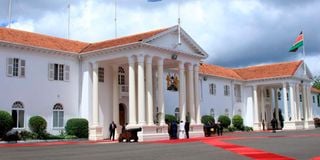Premium
It is time to ask if State is worth the taxes, power and respect we give it

State House, Nairobi.
An examination of all the ultimatums issued by the government of Kenya in the past year reveals that our government, whilst seeming grave and ominous, has actually been embarked upon a most unstately retreat from its constitutive mandates as well as a positively suicidal abdication from the terms of the foundational compact of all politics and government.
As matters stand, it is legitimate to ask whether the Kenyan State is actually worthwhile, and if it has not, over time, turned into the political equivalent of baal.
The potency of the government of Kenya is essentially verbal.
Few other governments are capable of issuing sterner warning, tougher admonition, stronger condemnation, more ominous deadlines or fearful ultimatums than the Government of Kenya.
The frequency and scope of these governmental eruptions are remarkable because they are rarely followed through with action.
To be fair, enforcement can be costly, but this ought to be considered while contemplating the wisdom of a threat in the first place.
Territorial war is largely out of the question and even locally, confronting the marauding hordes of bandits who have laid waste to large swathes of the country remains a ginger affair.
Investing sound public policy bandwidth to immunize our institutions against internal and external encroachments has never been a particular priority of government.
Investing in the people of Kenya appears to be anathema.
We really have never made a good fist of the bandit menace in any of their various manifestations, be they urban gangsters or range-land rustlers.
The traditional response has been to constitute a tangled array of ‘special squads’ which rapidly become a problematic end in themselves, posing institutional complications that ultimately hinder progress.
Border disputes simmer on, with ambitious foreign claims often catalysed by a wretched admixture of disastrous diplomacy and delusional political brinkmanship.
Whether it is a rock inside a lake or a block in the ocean, our singular talent for bungling is ever in spectacular display.
We are in debt; we owe everybody lots of money.
The debt register may not fully reflect the full extent of our prodigal situation, and the terms of some instruments could be odious enough to subject the country to arrangements significantly worse than colonialism.
In any event, the increasingly gruelling effort expended to secure meagre accommodations from our multilateral lenders indicates that our sovereign autonomy has been a fiction for a while now.
Come Covid-19, the government made it clear that it would do the bare minimum, and would not stand in the way of the virus as it ravaged Kenya.
Most of the cost of the pandemic was met privately by Kenyans, whose lives and livelihoods were attenuated in a struggling economy, jeopardized by the pandemic and devastated by the government’s ham-fisted containment measures.
Outside of international charity, the idea of a resolute, rational, coherent and effective government plan to test and treat Kenyans remains a mockery. Local vaccine research and development seems to be anathema in principle.
However, the government did not hesitate to lean hard on its bloodiest, least effective, most wasteful, traumatic and disruptive instrument as an all-purpose response to all its problems.
Boots, batons, guns, tear-gas and bullets were profligately deployed against citizens. Innumerable violations of constitutional freedoms and fundamental human rights, including wanton cruelty, detention without due process and extra-judicial killing were perpetrated all over the country.
In this transgression, the security forces were vociferously motivated by addled State functionaries who equate violent brutality and flagrant delinquency with power.
Instead of considerately using state authority to rescue Kenyans from the cusp of petrifying precarity, the State brutally kicked them into an abyss of existential terror where they remain even now.
This is supremely ironic, because the fundamental purpose of the State is to give confidence and secure the peace of its citizens. The authority donated by citizens to the State confers monopoly of immense power, sufficient to protect their lives and guarantee their liberties.
This arrangement is to liberate the people from the infernal desolation of Stateless bedlam, which Thomas Hobbes describes as... “No arts, no letters, no society; and, which is worst of all, continual fear, and danger of violent death; and the life of man, solitary, poor, nasty, brutish and short.”
In the perverse teleology of the Kenyan State, this Hobbesian dystopia is instigated by the State which should be eradicating it.
By its reprehensible abdication, government has thus liberated itself from its obligations under the social contract.
Seen in purely neoliberal terms, the retreat is strategic: The State thereby cedes space for oligarchs to privatize the provision of public goods, and is relegated to an agency for the realisation of private interests.
The acceleration of public-private schemes intended to displace State provision of public goods, emerging focus on commoditised citizen data and the blurring of important State-market boundaries are consistent with the intentional diminution of the State in tandem with the rapacious advance of insatiable oligarchs in all sectors.
The writer is an advocate of the High Court and a former State House speech writer.





